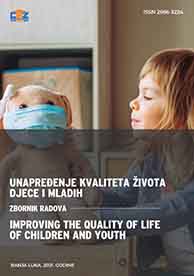SPECIFIČNOSTI U PROCESU OBRAZOVANJA MALOLETNIH DELINKVENATA
SPECIFICITIES OF THE EDUCATIONAL PROCESS OF JUVENILE DELINQUENTS
Author(s): Marija MaljkovićSubject(s): Educational Psychology, Behaviorism, Studies in violence and power, Victimology, Social Norms / Social Control, Sociology of Education
Published by: CENTAR MODERNIH ZNANJA
Keywords: juvenile delinquents; educational profile; educational status;
Summary/Abstract: The initial research in the field of juvenile delinquency and crime has pointed out the significant connection between schooling problems and juvenile delinquency. A large number of delinquents have had multiple problems throughout their schooling or have not attended classes. The research conducted in the institutions that treat juvenile delinquents has shown that there are certain characteristics of the process of education which occur on two levels. The first level refers to the characteristics of their educational profile, expressed through their educational level, educational aspirations, and specific learning problems. The second one refers to their educational status, that is to say, whether they are included in the educational process or not. The goal of this paper is to analyze specific characteristics and the schooling problems of juvenile delinquents. The data analysis was conducted by using multivariate analysis of variance, correlation analysis, as well as the analysis of judicial statistics on registered juvenile delinquency in the Republic of Serbia from 2012 to 2019. The results of the research have shown that juvenile delinquents lag in the process of primary education, the so-called educational deficit is pronounced, their educational aspirations and their motivation are usually on the much lower level, and they have a whole range of specific educational problems in contrast to their non-delinquent peers. Furthermore, about 40% of juveniles (from 38.8% in 2012 to 41.6% in 2019) at the moment of committing a crime and around 41.5% of juveniles (from 47.3% in 2012 to 35.5.% in 2019) at the moment of receiving the verdict were not included in the educational system, or the pertaining information was not obtained. Also, even though the number of juvenile delinquents who had received the sentence decreased, especially in the last three monitored years (2017, 2018, 2019), at the same time there was an increase in the number of juvenile delinquents outside the educational process. Based on the research results, the conclusion drawn is that efforts should be made by all the main actors (from schools, through the family, to the judiciary) to prevent the interruption of schooling, i.e. the exclusion of juveniles from the educational system.
Journal: DRUŠTVENE DEVIJACIJE
- Issue Year: VI/2021
- Issue No: 6
- Page Range: 22-30
- Page Count: 9
- Language: Bosnian, Croatian, Serbian

